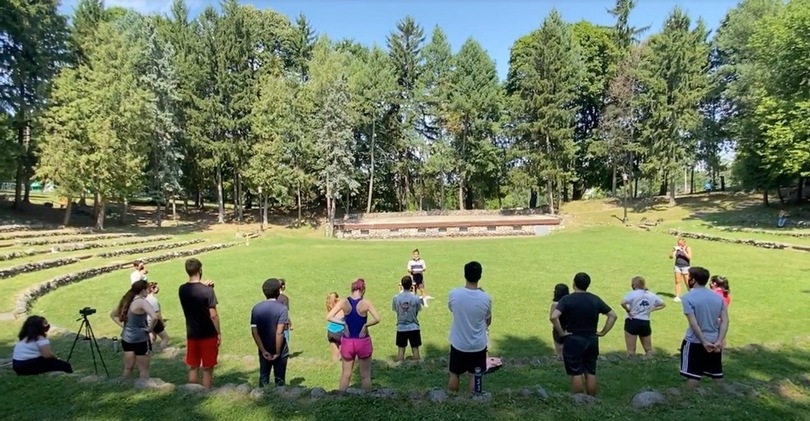Students bring ‘mind, body and soul’ to season 3 of ‘Syrvivor Syracuse’

Joseph Saccomano / The Daily Orange
The competitors and crew of “Syracuse Syrvivor" at the start of Season 3 filming.
Get the latest Syracuse news delivered right to your inbox.
Subscribe to our newsletter here.
Holly Westbrook grew up watching the CBS reality show “Survivor,” so when she had the opportunity to compete on the student-run campus version, “Syrvivor Syracuse,” she applied.
Besides working as a resident advisor, she said she didn’t participate in many other student activities and wanted to join more groups. “I really wanted something super fun and not academically involved at all,” Westbrook said. “And it’s been one of the best decisions that I‘ve made at SU.”
Though unaffiliated with the original CBS show, “Syrvivor” follows the same premise: competitors, sorted into different tribes, compete in challenges and vote others off to see who will be the last one standing. The show was filmed on Syracuse University’s campus starting in August 2020, and it drew students from a variety of majors, allowing casts and crews to get to know many people across the SU community. On Thursday evening, Westbrook, the season three premiere will air on Youtube.
The 21 contestants in the upcoming season are split into three color-coded tribes: “mind,” “body” and “soul.” Because contestants must meet and work with the other players in their tribe, Westbrook, a member of “body,” describes “Syrvivor” as a “social game.”
“You’re basically put in a group of random people and you have to decide, through challenges that you’re doing with your team and through individual interactions with people, who you want to keep and who you want to vote off so that you in the end can be the last person standing,” said Westbrook, an SU senior.

On Thursday, June 11, Season 3 of “Syrvivor” will air on Youtube.
Courtesy of Syracuse Survivor
Before filming, the show’s production team meets to plan the upcoming season. They decide on challenges and tribes, and they go through applications to choose the new cast. Filming the show itself is a time-consuming process for the competitors. Westbrook said she constantly texted and FaceTimed other participants for the show.
Filming during the pandemic, though, presented a challenge for the “Syrvivor” team unlike the preplanned challenges the production team created. When students were sent home in March 2020, they were down to the final few contestants so they had to finish filming over Zoom. The show’s host, Luke Uriarte, and the production team worked to keep everyone engaged during the virtual aspects of filming, said Andrew Clarke, a rising junior at SU who was competing on season two of the show at the time.
“It’s difficult to really stay passionate about something and participate in this game, where it’s so focused on relationships, when you can’t actually see these people,” Clarke said. “So the way that Luke and everyone else was really able to keep everyone involved, keep them passionate about what they were doing, was really incredible.”
Filming started for season three as students returned to campus in August for the start of the fall 2020 semester. Since COVID-19 regulations were ever-changing due to fluctuations in case numbers, the crew and production team also had to be prepared for a variety of scenarios. When the production team began its planning for the third season, Clarke said the team developed two variations for each week of the show — one plan for if they could film in person and one plan for if they had to be virtual.
The show took place primarily outside in order to follow the university’s COVID-19 restrictions and regulations. The crew and competitors gathered in the Thornden Park amphitheater for tribals — the meetings where contestants are voted off — and on the quad for challenges. When in-person learning was paused, they met on Zoom.
Instead of talking face-to-face, a lot of the communication and bonding between cast members had to happen virtually over platforms like FaceTime. SU senior and member of “mind” Kevin Wu used FaceTime to his advantage to mask body language.
“(On) FaceTime … you can hide so many things that you can’t necessarily read, like body expression,” Wu said.
For competitors who applied to the show before the pandemic began, their experience filming and completing challenges was different than what they had originally expected. Wu, who learned he got a spot in the spring 2020 semester before the pandemic sent him home, said it was difficult for him to play the game and connect with the other competitors virtually.
Many competitors, though, were still able to develop bonds and a sense of community with the other cast members, despite competing virtually. The friendships players form even keep many of the players involved in production roles after the ends of their seasons. After filming season three, Wu stepped into the social media management role on the organization’s executive board, and Westbrook will work on the production for upcoming seasons.
“The amazing people that I’ve met through it, I really just wanted to continue that,” Westbrook said. “I think the behind the scenes stuff is really cool because you get to basically watch the season unfold as it’s being filmed.”





